
Alexander Aleksandrovich Alekhine was a Russian and French chess player and the fourth World Chess Champion, a title he held for two reigns.
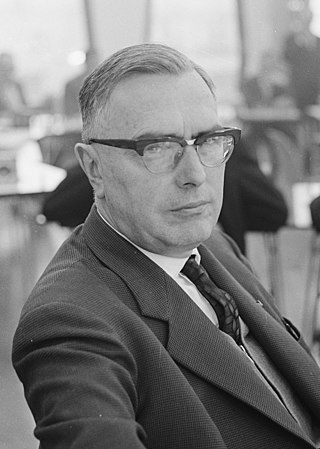
Machgielis "Max" Euwe was a Dutch chess player, mathematician, author, and chess administrator. He was the fifth player to become World Chess Champion, a title he held from 1935 until 1937. He served as President of FIDE, the World Chess Federation, from 1970 to 1978.
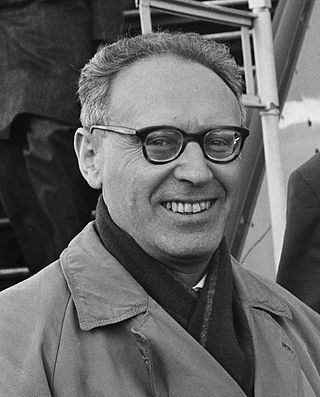
Mikhail Moiseyevich Botvinnik was a Soviet and Russian chess grandmaster who held five world titles in three different reigns. The sixth World Chess Champion, he also worked as an electrical engineer and computer scientist and was a pioneer in computer chess. He also had a mathematics degree (honorary).

Vasily Vasilyevich Smyslov was a Soviet and Russian chess grandmaster, who was the seventh World Chess Champion from 1957 to 1958. He was a Candidate for the World Chess Championship on eight occasions. Smyslov twice tied for first place at the USSR Chess Championships, and his total of 17 Chess Olympiad medals won is an all-time record. In five European Team Championships, Smyslov won ten gold medals.

Paul Keres was an Estonian chess grandmaster and chess writer. He was among the world's top players from the mid-1930s to the mid-1960s, and narrowly missed a chance at a World Chess Championship match on five occasions. As Estonia was repeatedly invaded and occupied during World War II, Keres was forced by the circumstances to represent the Soviet Union and Nazi Germany (1941–44) in international tournaments.

Alexander Alexandrovich Kotov was a Soviet chess grandmaster and author. He was a Soviet chess champion, a two-time world title Candidate, and a prolific writer on the subject of chess. Kotov served in high posts in the Soviet Chess Federation, and wrote most of his books during the Cold War. The importance and breadth of Kotov's work rank him among the all-time greats in this field.

Salomon Mikhailovich Flohr was a Czechoslovak and Soviet chess player and writer. He was among the first recipients of the title International Grandmaster from FIDE in 1950. Flohr dominated many tournaments of the pre-World War II years, and by the late 1930s was considered a contender for the World Championship. However, his patient, positional style was overtaken by the sharper, more tactical methods of the younger Soviet echelon after World War II.
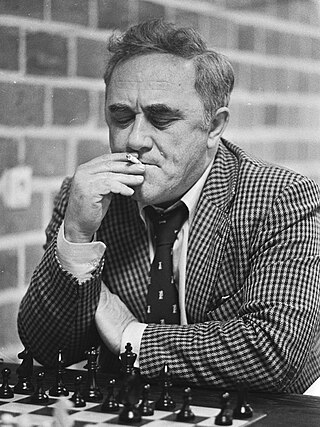
Efim Petrovich Geller was a Soviet chess player and world-class grandmaster at his peak. He won the Soviet Championship twice and was a Candidate for the World Championship on six occasions. He won four Ukrainian SSR Championship titles and shared first in the 1991 World Seniors' Championship, winning the title outright in 1992. His wife Oksana was a ballet dancer while his son Alexander was also a chess master. Geller was coach to World Champions Boris Spassky and Anatoly Karpov. He was also an author.
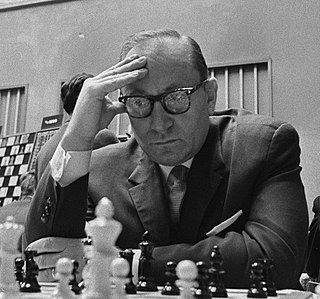
László Szabó was a Hungarian chess player. He was awarded the title of International Grandmaster in 1950, when it was instituted by FIDE.
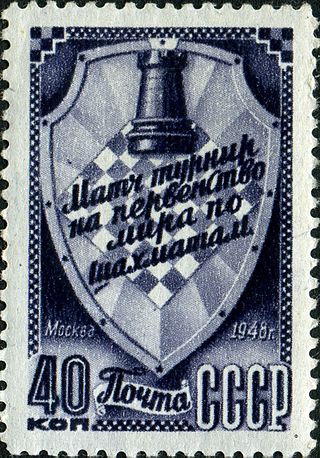
The 1948 World Chess Championship was a quintuple round-robin tournament played to determine the new World Chess Champion following the death of the previous champion Alexander Alekhine in 1946. The tournament marked the passing of control of the championship title to FIDE, the International Chess Federation which had been formed in 1924. Mikhail Botvinnik won the five-player championship tournament, beginning the era of Soviet domination of international chess that would last over twenty years without interruption.
The Nottingham 1936 chess tournament was a 15-player round robin tournament held August 10–28 at the University of Nottingham. It was one of the strongest of all time.
Lev Solomonovich Aronin was a Soviet International Master of chess. He was a meteorologist by profession.
Vladimir Alexeyevich Alatortsev was a Soviet chess player, author, and administrator. During his career, he became champion of both Leningrad and Moscow, and played in the Soviet Chess Championship finals nine times, with his best competitive results in the 1930s. He placed clear second in the 1933 Soviet final. He retired from most competitive play in the early 1950s, moving into roles as a chess organizer, teacher, and coach. He served as chairman of the All-Union chess section from 1954 to 1959 and as chairman of the USSR Chess Federation from 1959 to 1961. By profession, he was a hydraulics engineer.
The Interregnum of World Chess Champions lasted from the death of incumbent World Chess Champion Alexander Alekhine on 24 March 1946, until Mikhail Botvinnik won a specially organized championship tournament to succeed him on 17 May 1948.
The Hastings International Chess Congress is an annual chess tournament which takes place in Hastings, England, around the turn of the year. The main event is the Hastings Premier tournament, which was traditionally a 10 to 16 player round-robin tournament. In 2004/05 the tournament was played in the knock out format; while in 2005/06 and 2006/07 it was played using the Swiss system. Alongside the main event there is the challengers section, which is open to all players. The winner of the challengers event earns an invitation in the following year's Premier.

Georgy Mikhailovich Lisitsin or Lisitsyn was a Russian chess master from Leningrad. After high school he entered the Leningrad Industrial Institute, from which he graduated as a mechanical engineer.

A World Chess Championship was played between Mikhail Botvinnik and Vasily Smyslov in Moscow from March 16 to May 13, 1954. Botvinnik had been World Champion since 1948 and had successfully defended the title in 1951, while Smyslov earned the right to challenge by winning the 1953 Candidates tournament.
The below is a list of events in chess in 1939.
Zürich 1934 was an international chess tournament held in Zürich from 14 to 29 July 1934 to commemorate the 125th anniversary of Schachgesellschaft Zürich. Alexander Alekhine won, followed by Max Euwe and Salo Flohr tied for second-third. The tournament also served as the 1934 Swiss Championship, won by Hans Johner as the highest-ranking Swiss player.
Moscow 1935 was the second international chess tournament held in Moscow, taking place from 15 February to 15 March 1935. Salo Flohr and future world champion Mikhail Botvinnik tied for first, followed by former world champions Emanuel Lasker and José Raúl Capablanca.














